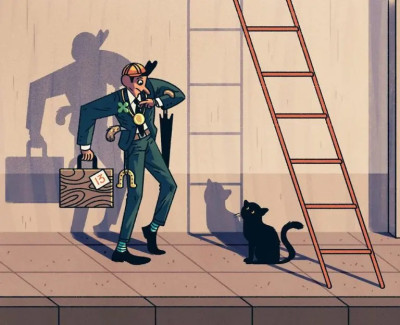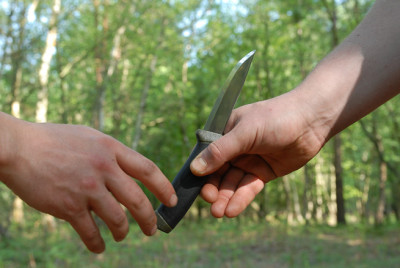

I. Introduction
When examining the custom of passing knives, an intriguing phenomenon emerges. Instead of handing knives directly, individuals often place them on a table for others to retrieve. Interestingly, this practice does not stem from halachic restrictions. Contrary to assumptions, halachah does not prohibit direct hand-to-hand transfer of knives to friends or acquaintances.
II. Precedent
In the book Otzar HaMinhagim1, Rabbi Ze'ev Reichman writes: "It's customary not to give a knife as a gift, and also to purchase one specifically. Similarly, one should not hand a knife from hand to hand; instead, place it down and let the other person take it.” In Keter HaMalka (Part 2, pg. 137), it's written2: "Our revered rabbi (The Rebbe of Biyala) accepted from his father not to hand a knife or scissors directly.” Despite the prohibition, the underlying reason remains unspecified.
III. Practical, Symbolic, Superstition
Research into the reasons behind the prohibition on passing knives and sharp objects reveals two primary interpretations: a practical one focused on safety concerns, and a symbolic one.
Rav Meir Mazuz3 addressed a query regarding his practice of not accepting scissors directly during a halaka haircut. An individual recalled Rav Mazuz asking him to place the scissors on the table instead. Rav Mazuz explained, "This is our established practice: avoiding direct hand-to-hand transfer of knives and scissors. This custom roots in Tractate Midot (3:4), which teaches, 'It's unlawful for the shortener to be placed on the lengthener,' since iron shortens one’s lifespan.
Similarly, in Beshivilei HaMinhag (Part 1), Rabbi Eliakim ben Yishai'ahu quotes Sefer Yafeh LeLev4 (Part Yoreh De'ah, Siman 116): "To explain this custom based on Tractate Midot, which states iron shortens one's lifespan."
On the other hand, practical considerations underscore the potential dangers associated with passing knives and sharp objects. Rabbi Ran Yosef Abuhatzira5 writes: "Our rabbis have taught not to hand knives, scissors or any sharp object directly, demonstrating caution.” The table placement serves as a precautionary measure, prioritizing safety and avoiding potential accidents.
Rav Bentzion Mutzafi addressed6 a query regarding the permissibility of handing a knife directly from hand to hand, and whether this prohibition was merely a superstition. He clarified that according to later rabbinic authorities, the preferred approach is to place the knife on a table near the recipient, rather than handing it directly. However, if no table is available, direct hand-to-hand transfer is permissible, provided caution is exercised. In a different responsa7 he writes This prohibition lacks a clear textual basis, potentially reflecting a broader concern for vigilance and responsible behavior.
However, some consider this custom a superstition. Rav Shlomo Aviner8 views this belief as a misguided superstition originating from non-Jewish sources, recommending caution instead. In many cultures, when passing sharp objects, they are typically placed on a table for retrieval, rather than handed directly. Similarly, when returning the sharp object, attempting to hand it back directly may be met with resistance. Passing knives or sharp objects directly from person to person is considered bad luck, signifying a desire to provoke conflict.
IV. Conclusion
When passing metal objects like knives, needles, nails, or scissors, it is customary to place them on the ground rather than handing them directly. This practice is rooted in both practical concerns and symbolic beliefs. From a practical standpoint, directly handing sharp objects can increase the risk of accidental injury. Symbolically, this act is believed to shorten a person's lifespan. Iron, a common material in these objects, is often associated with such negative connotations. However, some view this custom as a mere superstition adopted from non-Jewish sources that has become integrated into Jewish tradition.
נהגו שלא לתת סכין במתנה וגם במנהג זה נהגו לקנות דווקא, וכן שאין להעביר בכל פעם סכין מיד ליד אלא יניחנו וייקחנו
השני
כ"ק רבינו (רבה"ק מביאלא) שליט"א קיבל מאביו כ"ק רבינו זי"ע שלא להעביר סכין וכן מספרים מיד ליד אחד לשני
3 Shu”t Mekor Ne’eman, Vol. 3 page 304
שאלה: לפני כמה שנים באתי לכבודו יחד עם בני לתספורת "חלאקה", וכשהגשתי את המספריים לכבודו, ביקשני להניחן על השלחן ולא לקח מידי את המספריים. ברצוני ללמוד טעם הנהגה זו
תשובה: כך נוהגים אצלנו, לא למסור סכין ומספריים מיד ליד, לפי שהברזל נברא לקצר ימיו של אדם ח"ו, כמו שאמרו במסכת מדות (פרק ג' משנה ד') שאינו בדין שיונף המקצר על המאריך
וכתב בספר נוהג בחכמה (הרב יוסף בן נאיים, ערך ברזל) להסביר מנהג זה על פי מה שאמרו במסכת מדות, שברזל נברא לקצר ימי אדם. ומפני זה אין מושיט הברזל מיד ליד. שלא ליתן ליד חברו דבר המקצר ימים
ספר מרי"ח ניחוח
ומילתא אגב אורחא יש לומר, מה שראיתי שאין מעבירין מיד ליד לא סכין ולא מספריים, ולא כל כיו"ב, ורבים וטובים נזהרים בכך, וכך גם נהגו חלק מיהודי צפון אפריקה, וראיה שהרבי מביאלא זי"ע גם הקפיד בדבר. ויש לומר שהמנהג הלז מהאי טעמא
כדי שלא ליתן סכין הרומז לס"מ, ביד חברו
מובא בפוסקים האחרונים שלכתחילה יניח על השלחן לידו, ואם אין לפניו שלחן ימסור לו דרך הידית
https://www.doresh-tzion.co.il/QAShowAnswer.aspx?qaid=285310. Retrieved Oct. 30, 24.
שאלה - 2673
שלום לכבוד הרב הגאון האם יש מקור לדבר שאסור להעביר סכין מיד ליד אלה להניח על השולחן ולקחת או שזה סתם שטות והמצאה? תשובה אין לזה מקור, ואולי זה ענין של זהירות טובה
8 Piskei Shlomo Vol.2 and Vol. 5
ש: האם זה נכון שהעברת סכין מיד ליד גוררת למריבה
ת: לא נכון. זו אמונה תפלה ממקור גוי, אלא פשוט יש להיזהר (נר באישון לילה
By Rabbi Nissan Shalomayev
Rav, Bukharian Jewish Cong. of Hillcrest, Kehilat Ohr V’Achdut
Passing Scissors And Knives
Typography
- Smaller Small Medium Big Bigger
- Default Helvetica Segoe Georgia Times
- Reading Mode




